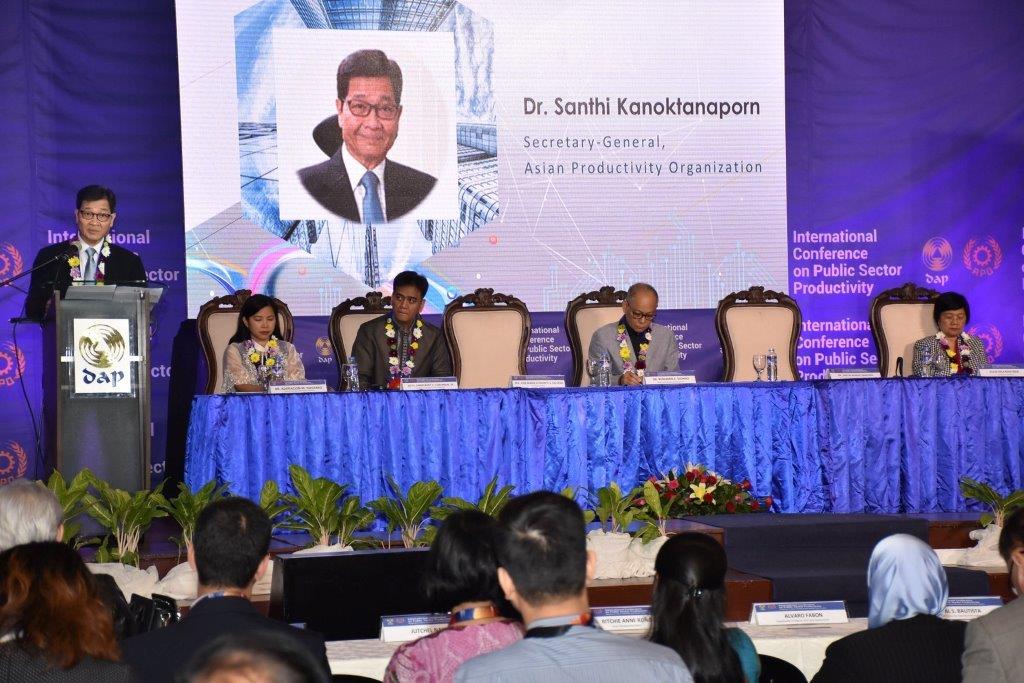
Select Page
Asian Productivity Organization (APO) Secretary-General Dr. Santhi Kanoktanaporn called upon policymakers and public-sector professionals to catch up with technology-driven disruptions and changing business models so that they can help improve government service delivery and meet the increasing expectations of citizens.
At the 2nd International Conference on Public-sector Productivity in Tagaytay City, the Philippines, 22 November 2018, Dr. Santhi also emphasized that APO member governments, policymakers, and public-sector professionals needed to focus on creating an environment for transforming the industry, agriculture, and service sectors and exploring options to meet future food security requirements.
 Organized in partnership with the Development Academy of the Philippines, the conference deliberated on trends impacting future governance in APO member countries and on innovative public-service delivery leadership for productivity enhancement. The conference was part of a series of APO projects for the public sector to support member countries in dealing effectively with the challenges faced by governments in executing productivity improvement strategies. It was attended by 385 participants, including 22 delegates from 14 APO member countries and APO-assigned resource persons from Australia, Finland, Hong Kong, Japan, Malaysia, and Sri Lanka.
Organized in partnership with the Development Academy of the Philippines, the conference deliberated on trends impacting future governance in APO member countries and on innovative public-service delivery leadership for productivity enhancement. The conference was part of a series of APO projects for the public sector to support member countries in dealing effectively with the challenges faced by governments in executing productivity improvement strategies. It was attended by 385 participants, including 22 delegates from 14 APO member countries and APO-assigned resource persons from Australia, Finland, Hong Kong, Japan, Malaysia, and Sri Lanka.
“If we look at the realities on the ground and compare corporate-sector service levels with those of the public sector, we realize that there is a drastic need to make government processes more efficient and improve productivity. This is also important because governments are now under tremendous pressure to move beyond the quantity and quality of output aspects to showcase outcomes or the results that they achieve in improving overall national socioeconomic development,” he said.
The Secretary-General reported that the APO had launched its Strategic Future Platform to build the foresight and scenario-planning capabilities of policymakers in member countries so that they can navigate the uncertain global environment and take informed, strategic decisions to sustain productivity growth.
“We have also launched the new Specific National Program to co-create productivity initiatives aligned with the specific needs of member governments. The program will help improve the macroeconomic environment for productivity enhancement in member countries through policy interventions,” he continued, adding that another initiative that would help member countries standardize their capacity-building initiatives was the Professional Certification Courses Program.
“Under this program, the APO will develop certified lead trainers for driving in-country training efforts and enable NPOs and affiliated organizations to become accredited certification bodies authorized to assess and certify productivity professionals complying with APO standards and requirements. This will support member governments in reskilling their workforces and developing new labor productivity knowledge to meet the requirements of future industries.”
Dr. Santhi also expressed concern about the slow pace of change in the agriculture sector. He informed conference delegates that the APO was developing an Agricultural Transformation Framework to help member countries meet their future food needs. He concluded that while technology was playing the role of an equalizer and helping in taking the right decisions, the public sector needed to play the role of catalyst and provide alternative pathways for economies to transform by reducing the impact of inhibitors.
Photos: DAP